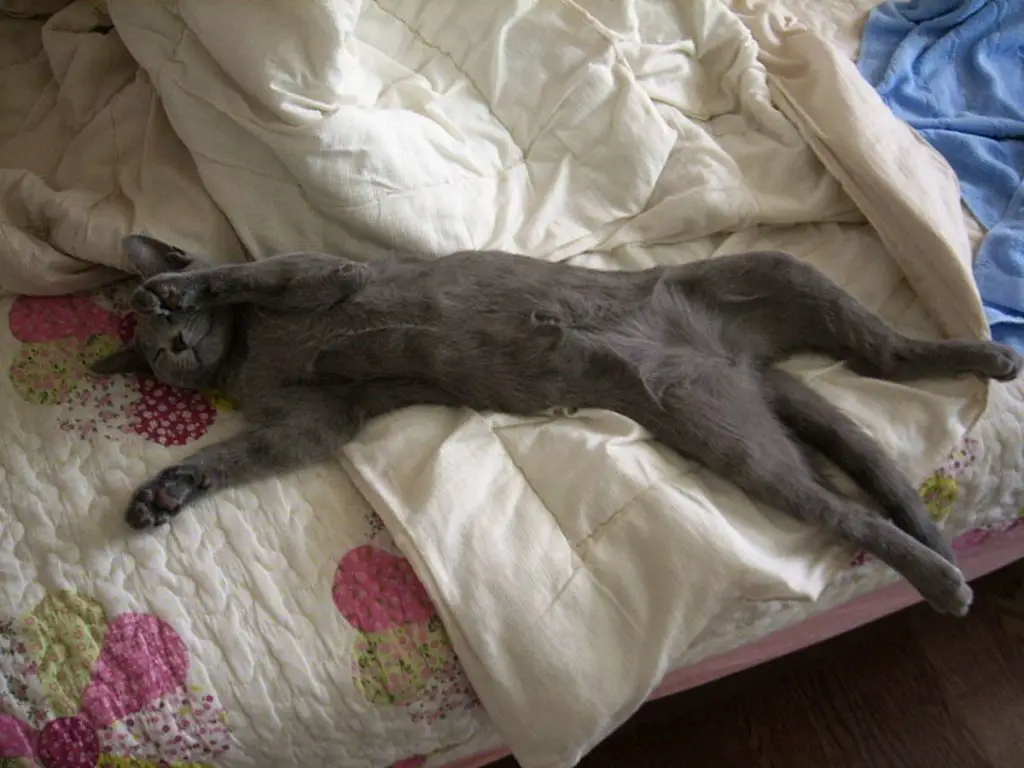Your cat may have peed on your bed while you were sleeping due to territorial marking or a medical issue. Here’s why this might have happened.
Cats are territorial animals, and they mark their territory by spraying urine. If your cat feels threatened or stressed, it may mark your bed as a way of claiming it. Additionally, cats may also urinate outside the litter box if they have a medical issue such as a urinary tract infection or bladder stones.
In some cases, changes in routine, a dirty litter box, or even a new pet or person in the household can trigger this behavior. It’s important to address the underlying cause and ensure your cat has a clean litter box, feels safe, and is in good health. Seek advice from a veterinarian if the problem persists.
Understanding The Behavior
Understanding why your cat peed on your bed while you were sleeping is crucial for addressing this behavior. There can be several reasons for this inappropriate elimination, including signs of stress and behavioral issues.
Signs of stress in cats: Cats can experience stress due to changes in their environment, such as a new pet or a move to a new house. This stress might result in marking their territory, including your bed.
Behavioral issues in cats: In some cases, cats may have underlying behavioral issues that can lead to inappropriate elimination. These issues can include anxiety, fear, or medical conditions like urinary tract infections.
When dealing with this behavior, it is essential to identify the root cause and address it appropriately. Providing a comfortable and stress-free environment for your cat, regular litterbox maintenance, and consulting with a veterinarian can help alleviate the problem and prevent future occurrences.
Medical Causes
- Urinary Tract Infections: Cats can develop urinary tract infections, which can lead to discomfort and inappropriate urination.
- Bladder Stones: The presence of bladder stones can cause pain and irritation, prompting a cat to urinate outside the litter box.
- Diabetes: Cats with diabetes may experience increased thirst and urination, leading to accidents outside of the litter box.
- Kidney Disease: Cats with kidney disease may have difficulty controlling their bladder, resulting in accidents.
- Feline Lower Urinary Tract Disease (FLUTD): FLUTD is a common condition that affects the bladder and urethra, causing issues with urination and potentially leading to accidents.
These medical conditions can cause changes in a cat’s urinary habits, leading to urination on the bed. It’s important to consult a veterinarian for proper diagnosis and treatment. Addressing any underlying medical issues can help prevent further incidents of inappropriate urination.
Environmental Factors
Cats may pee on beds due to environmental factors, such as changes in their routine or stress. It is important to understand their needs and provide a comfortable, stress-free environment to prevent this behavior.
Problematic Litter Box
Cats can exhibit inappropriate elimination behavior, such as peeing on your bed while you sleep, due to various environmental factors. One common issue is a problematic litter box. Cats may avoid using a litter box that is dirty, too small, or in a noisy or high-traffic area. Ensure the litter box is consistently cleaned and located in a quiet and easily accessible spot. If you have multiple cats, it’s important to provide one litter box per cat plus an extra one as a rule of thumb.
Changes In The Household
Cats are sensitive creatures and disruptions in their environment can lead to stress and behavioral changes. Moving to a new home, introducing a new pet or family member, or rearranging furniture can all cause anxiety and prompt a cat to mark their territory. Provide your cat with a safe and predictable environment to minimize the chances of unwanted elimination behaviors.
Territory Marking Behavior
Some cats mark their territory by spraying urine, especially if they feel that their territory is being threatened. This behavior is commonly seen in intact male cats but can also occur in spayed or neutered cats. Consult a veterinarian to discuss potential solutions and consider providing vertical scratching surfaces and pheromone sprays to help ease territorial anxiety.
Lack Of Cleanliness Or Privacy
Cats are naturally clean animals and may avoid using a litter box that is unclean or lacks privacy. Regularly scooping the litter box and changing the litter can help prevent your cat from seeking alternative elimination spaces, including your bed. Provide a quiet and secluded area for the litter box to offer your cat the privacy they desire.
Veterinary Care
It can be distressing when your cat pees on your bed while you are sleeping. One of the first steps you should take is to schedule a vet appointment as soon as possible. This will allow a professional to examine your cat and determine the underlying cause of this behavior.
Your vet may request a urine sample from your cat to analyze. This will help to identify any potential medical issues, such as urinary tract infections or kidney problems, that may be contributing to the inappropriate urination.
Once the cause of your cat’s behavior has been identified, your vet will be able to recommend appropriate treatment options. This may include medication, dietary changes, or environmental modifications to help alleviate the issue and prevent future incidents.
Behavioral Interventions
Behavioral interventions can be vital in addressing the issue of cats peeing on the bed while we are sleeping. Providing enrichment activities ensures that our feline friends have enough mental and physical stimulation in their lives. This helps to keep them engaged and fulfilled, reducing the likelihood of unwanted behaviors like inappropriate elimination.
In addition to enrichment, it is crucial to reduce stressors in the environment. Cats are sensitive creatures, and certain triggers can cause anxiety or distress. By identifying and removing these stressors, such as loud noises or unfamiliar people, we can create a more calming environment for our cats, minimizing the chances of them peeing on the bed.
To reinforce proper elimination behavior, it is essential to offer appropriate litter box options. Ensuring that the litter box is easily accessible, clean, and has the right type of litter can encourage cats to use it consistently. Additionally, placing a litter box in the area where the cat has previously eliminated can redirect their behavior towards a more suitable location.

Credit: www.reddit.com
Litter Box Management
Having a cat pee on your bed while you were sleeping can be frustrating and confusing. However, understanding the reasons behind this behavior can help prevent it from happening again in the future.
| Choosing the Right Litter Box |
| Ensure that the litter box is large enough for your cat to move comfortably. Cats may avoid using a litter box that feels cramped or small. |
| Consider providing multiple litter boxes if you have multiple cats. Some cats prefer having their own designated litter box. |
| Experiment with different types of litter to find the one that your cat prefers. Some cats have specific preferences for litter texture or scent. |
- Ensure the litter box is placed in a quiet and easily accessible area. Cats prefer privacy when using the litter box.
- Avoid placing the litter box near busy areas or loud appliances that may startle or disturb your cat while they use it.
- Consider placing multiple litter boxes in different areas of your home, especially if you have a multi-story house.
- Scoop the litter box at least once a day to remove waste. Cats may avoid using a dirty litter box.
- Regularly change the litter and clean the litter box to keep it fresh and odor-free. Follow the instructions provided by the litter manufacturer.
- Avoid using strong-scented cleaning products near the litter box, as they may deter your cat from using it.
By following these litter box management tips, you can create a comfortable, clean, and inviting environment for your cat, reducing the likelihood of them peeing on your bed while you sleep.
Creating A Cat-friendly Environment
Maintaining a cat-friendly environment is crucial to prevent unwanted behaviors like peeing on the bed. One way to create a cat-friendly environment is by establishing routine and structure. Cats are creatures of habit and thrive on having a predictable schedule. Make sure to feed them at the same time every day, clean their litter box regularly, and provide consistent playtime and affection.
Another important aspect of a cat-friendly environment is providing vertical spaces. Cats love to climb and jump, so having cat trees, shelving, or wall-mounted perches can give them opportunities to explore and feel secure. This also helps to create separate spaces for each cat in multi-cat households.
Additionally, it’s crucial to provide sufficient resources for each cat. This includes having multiple litter boxes placed in different areas of the house, as well as providing enough food and water bowls in separate locations. Cats are territorial animals, and having enough resources can help prevent conflicts and reduce stress.
In conclusion, by establishing routine and structure, providing vertical spaces, and ensuring sufficient resources, you can create a cat-friendly environment that encourages positive behaviors and reduces the likelihood of your cat peeing on your bed while you’re sleeping.
Regular Veterinary Check-ups
Regular veterinary check-ups are crucial in monitoring your cat’s health and identifying any potential issues early on. These check-ups allow the vet to assess your cat’s overall well-being and provide necessary vaccinations and treatments. By scheduling regular appointments, your vet can keep a close eye on your cat’s urinary system, ensuring it functions properly.
Detecting urinary problems early can help prevent your cat from peeing on your bed while you are sleeping. Cats may develop urinary tract infections or other medical conditions that can cause them to urinate outside the litter box. Regular check-ups enable the vet to identify and address such issues promptly.
In addition to regular check-ups, there are preventive measures you can take to address common problems. Providing a clean litter box, ensuring it is easily accessible, and using appropriate litter can encourage your cat to use it consistently. Creating a calm and stress-free environment for your cat, allowing for sufficient physical activity, and feeding a healthy diet can also contribute to preventing undesirable behavior such as peeing on your bed.
Remember, consulting with your veterinarian is essential for personalized advice and recommendations tailored to your cat’s specific needs.
Implementing Behavior Modification Techniques
Beyond figuring out why your cat peed on your bed while you were sleeping, it’s important to implement behavior modification techniques to prevent it from happening again. Positive reinforcement training is highly effective in promoting desired behaviors. By rewarding your cat with treats, praise, or playtime when they use their litter box, you’ll create a positive association with appropriate elimination.
Another technique to consider is using pheromone diffusers. These products release calming scents that can help reduce stress and anxiety in cats, reducing the likelihood of inappropriate elimination. Additionally, if the issue persists, it might be best to consult a professional behavioral expert who can provide personalized guidance and support.
Conclusion
To sum up, if you’ve woken up to find your cat peeing on your bed, it’s important to understand the reasons behind this behavior. Cats may exhibit this behavior due to medical issues, stress, territorial marking, or a dirty litter box.
By addressing these factors and providing the right environment, you can prevent future episodes and ensure your cat’s well-being. Remember, communication and patience are key in resolving this issue and maintaining a harmonious relationship with your feline friend.


